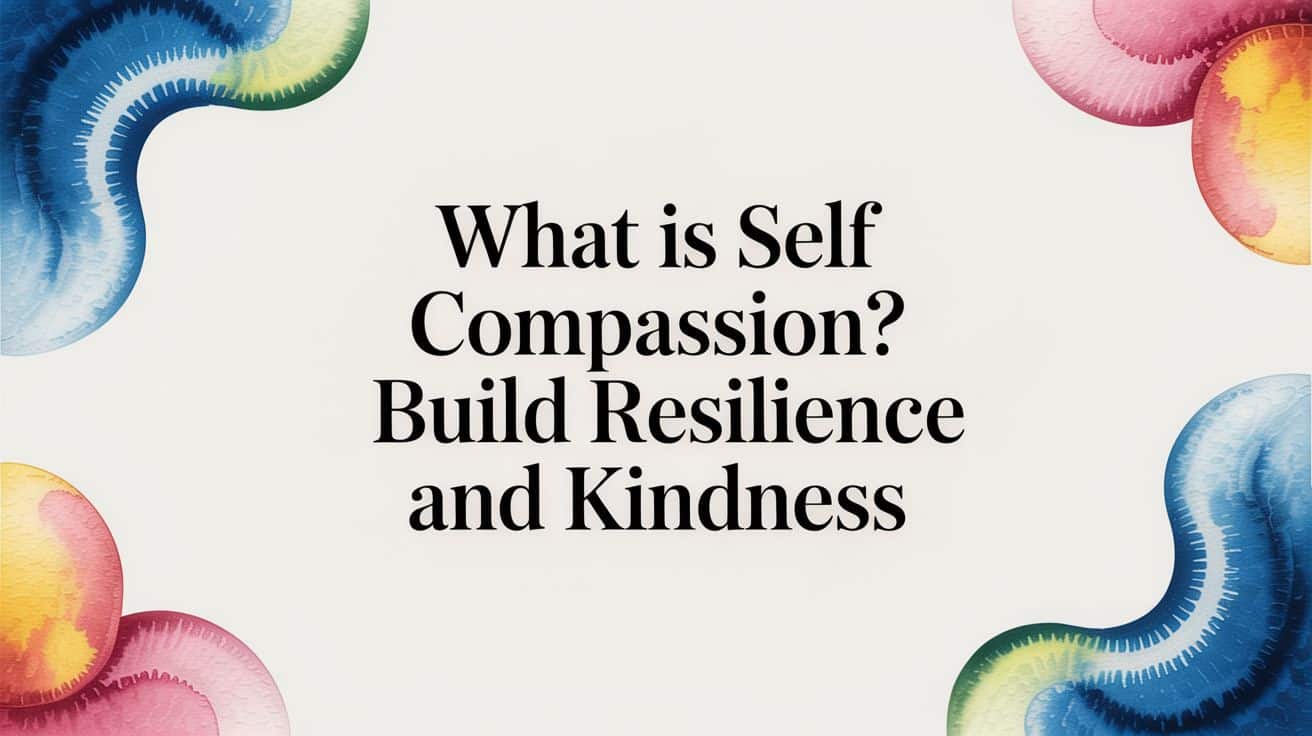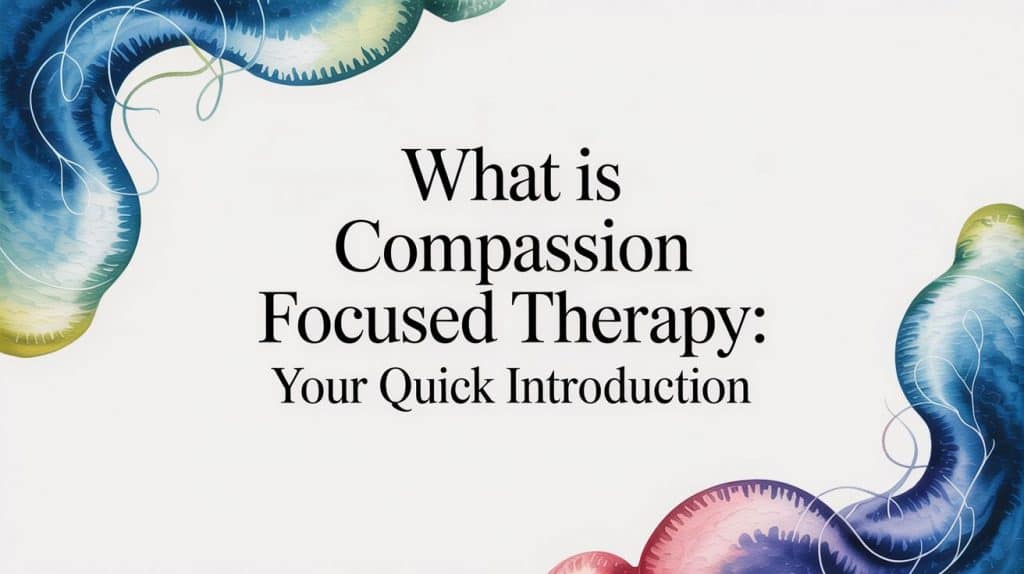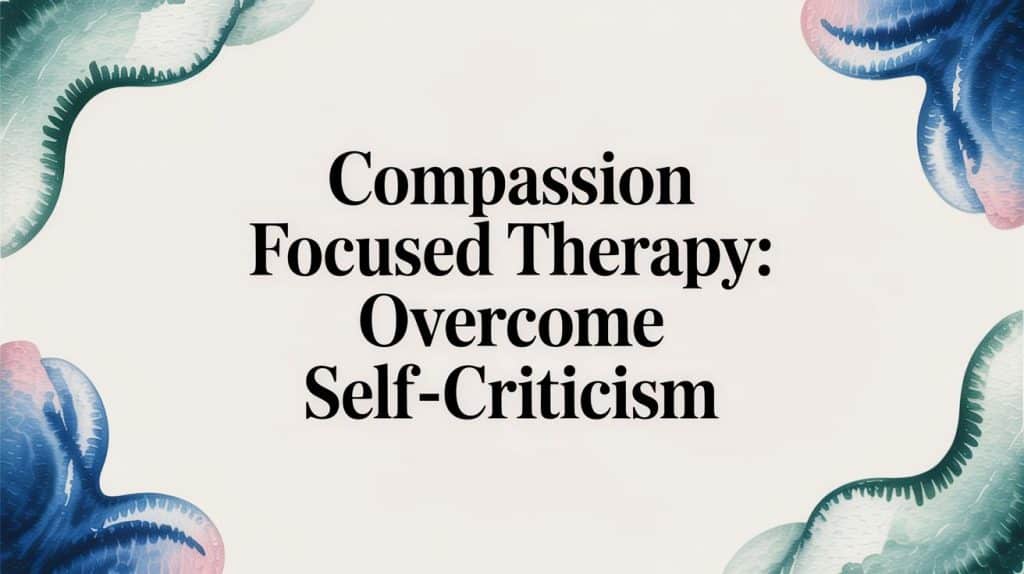Let's be honest, how do you talk to yourself when you mess up? If you’re like most people, that inner voice can be pretty harsh. Self-compassion is about changing that conversation. It’s simply about treating yourself with the same kindness and understanding you’d give to a good friend who was struggling.
Instead of piling on with self-criticism, you offer yourself warmth and support. It's a fundamental shift in your relationship with yourself.
Understanding the Core of Self-Compassion
Now, this isn't about letting yourself off the hook or wallowing in excuses. Far from it. Self-compassion is an active, courageous way of relating to yourself, especially when you’re navigating failure, hardship, or those all-too-familiar feelings of inadequacy.
It’s about building a stable, unconditional source of self-worth that doesn’t rise and fall with every success or failure.
Pioneering researcher Dr. Kristin Neff gives us a brilliant framework for this. She breaks self-compassion down into three core components. Think of them as the three legs of a sturdy stool—if one is missing, the whole thing wobbles. Together, they create a powerful and resilient internal support system.
The Three Pillars of Self-Compassion
These three pillars are the bedrock of a compassionate mindset:
- Self-Kindness: This is about being gentle and understanding with yourself when you’re suffering, instead of resorting to self-flagellation. It means actively comforting yourself when you're in pain, not punishing yourself for it.
- Common Humanity: This is the game-changing realisation that everyone struggles. Failure, imperfection, and pain are part of the shared human experience. Your mistakes don’t make you uniquely flawed; they connect you to everyone else.
- Mindfulness: This involves holding your difficult thoughts and feelings in a balanced awareness. You observe them with clarity and openness, without either suppressing them or letting them completely take over. It’s about finding that middle ground.
This infographic really brings to life how these three elements weave together.
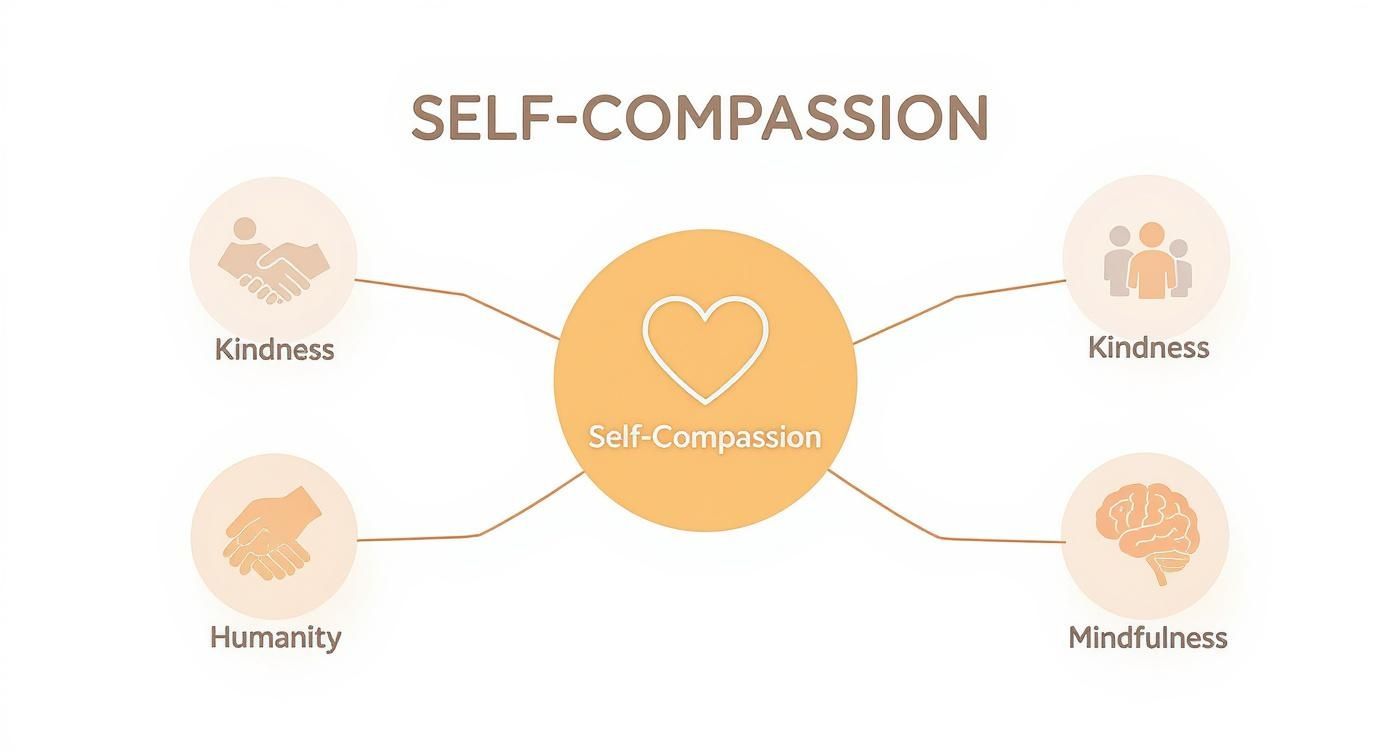
As you can see, they aren't just separate skills. They’re deeply interconnected, each one reinforcing the others to build genuine resilience from the inside out.
"Self-compassion isn't a destination; it’s a way of walking the path."
Getting a feel for the difference between your inner critic and your inner compassionate voice is key. One relentlessly tears you down, while the other helps you get back up. A compassionate response acknowledges the pain, validates your feelings, and offers encouragement. The critical voice, on the other hand, just doubles down on blame, shame, and isolation.
Learning to spot this difference is the first step toward consciously shifting your internal narrative.
To make this crystal clear, the table below breaks down Dr. Neff's three components, contrasting the kind, compassionate approach with its harsh, critical opposite. It's a practical way to see what you're aiming for.
The Three Pillars of Self-Compassion at a Glance
| The Pillar of Self-Compassion | What It Means (The Kind Approach) | Its Opposite (The Critical Approach) |
|---|---|---|
| Self-Kindness | Treating yourself with care and understanding. Actively comforting yourself when you're in pain. | Being harsh, judgmental, and self-critical. Punishing yourself for perceived failures. |
| Common Humanity | Recognising that suffering and imperfection are universal parts of the human experience. | Feeling isolated and believing that your struggles make you uniquely flawed or different from others. |
| Mindfulness | Observing negative thoughts and emotions with non-judgmental awareness. | Either exaggerating and getting carried away by negative feelings or suppressing and ignoring them. |
Looking at the two sides, you can really start to see how one approach fosters resilience and well-being, while the other keeps you stuck. The goal is to consciously choose the kind approach, pillar by pillar.
Breaking Down the Three Pillars of Self-Compassion
To really get to grips with self-compassion, we need to look beyond a simple definition and see how it actually shows up in our lives. The three pillars—self-kindness, common humanity, and mindfulness—aren't just abstract concepts. They're practical, active skills that, when woven together, create a powerful inner resource for navigating life's inevitable bumps.
Think of it like a balanced recipe for inner strength. Each component brings its own essential flavour, and together they help us respond to our own suffering in a way that is both genuinely nurturing and effective.
Let's break each one down.
Self-Kindness: The Antidote to the Inner Critic
The first pillar, self-kindness, is about making an active choice to be warm and understanding with yourself when you’re hurting, when you’ve failed, or when you just feel completely inadequate. It’s the direct opposite of that harsh, punishing inner critic that so many of us have on repeat.
Imagine a friend calls you, distraught after making a huge mistake at work. Would you tell them they're a total failure and should have known better? Of course not. You’d offer comfort, a listening ear, and some much-needed perspective. Self-kindness is simply about turning that same gentle, supportive response inward.
This isn’t about letting yourself off the hook or making excuses. It’s about creating a safe internal space to actually process what’s happened. This approach literally calms your nervous system, allowing you to learn from the experience without being crushed by shame. It's a conscious act of self-soothing when you need it most.
"Self-compassion entails being warm and understanding toward ourselves when we suffer, fail, or feel inadequate, rather than ignoring our pain or flagellating ourselves with self-criticism." – Dr. Kristin Neff
This shift from criticism to kindness is foundational. It’s the difference between kicking yourself when you’re already down and offering yourself a hand to get back up.
Common Humanity: The Connection That Heals
Next up is common humanity—the profound realisation that you are not alone in your struggles. When we mess up, our gut instinct is often to feel isolated, as if we're the only person on the planet who could make such a mistake. That sense of separation just pours salt on the wound.
Common humanity is the direct counter to this isolation. It’s the simple, grounding truth that imperfection, mistakes, and pain are part of the deal of being human. Everyone—without exception—experiences hardship and feels inadequate at times. Your struggles don't make you uniquely flawed; they connect you to everyone else.
This pillar helps you reframe your personal suffering within a much broader, more compassionate context.
- Instead of thinking: "What is wrong with me?"
- You can think: "This is a really difficult moment, and other people feel this way too."
This shift in perspective is incredibly powerful. It dials down the shame and helps you see your difficulties not as some personal failing, but as part of the shared, messy, and beautiful experience of being alive. It fosters connection instead of isolation.
Mindfulness: The Power of Balanced Awareness
The final pillar is mindfulness. When we talk about mindfulness in self-compassion, we mean holding our painful thoughts and feelings in a balanced awareness. It’s the practice of observing what's happening inside us without getting completely swept away by it.
This means we don't try to suppress our pain (which never works for long) or blow it out of proportion and let it spiral out of control. Mindfulness creates a little bit of space between you and your difficult emotions, allowing you to look at them with curiosity instead of judgement.
For example, when anxiety pops up, mindfulness allows you to notice, "I'm aware of the feeling of anxiety in my body," rather than getting lost in the thought, "I am an anxious person." That subtle change stops the emotion from defining your entire sense of self.
You acknowledge the pain without becoming the pain. This balanced awareness is what stops you from being pulled under by a storm of negativity, giving you the clarity you need to respond with kindness and wisdom.
The Science Behind a Kinder Inner Voice
Self-compassion isn't just a fluffy, feel-good idea; it’s a powerful practice with deep roots in our biology. Think about what happens when you let loose with harsh self-criticism. You’re actually flicking the switch on your own internal threat system—the same ancient mechanism designed to save you from a tiger in the grass.
This floods your body with adrenaline and cortisol, the big-ticket stress hormone, pushing you into a state of 'fight, flight, or freeze'.
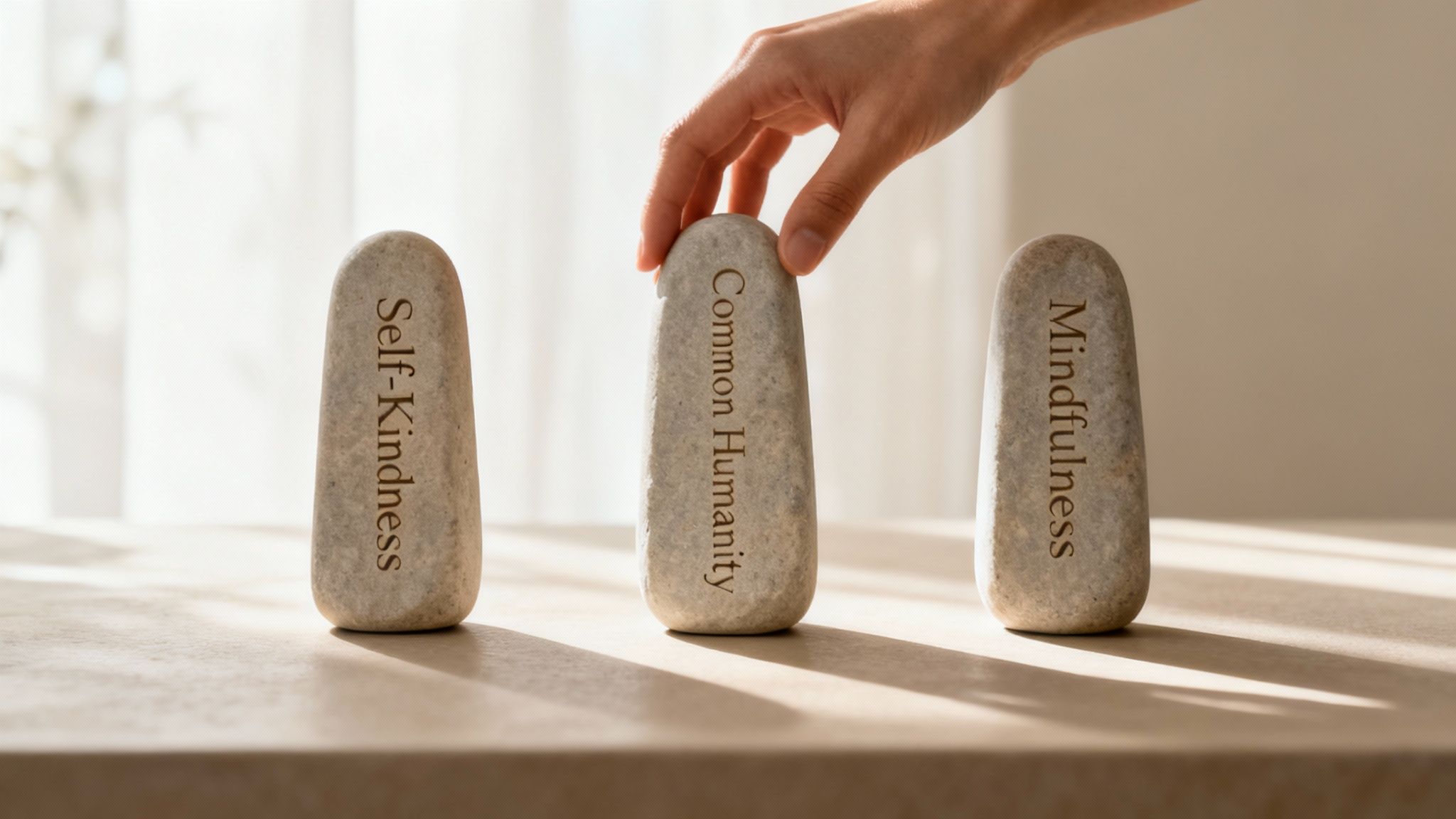
It’s a brilliant system if you’re genuinely in danger. But when the threat is your own perceived failure or inadequacy, that internal alarm bell becomes completely counterproductive. It just keeps you locked in a cycle of anxiety and defensiveness, making it almost impossible to learn, grow, or simply feel safe.
Calming the Threat System
This is where the science of self-compassion offers a way out. Instead of firing up our threat system, it taps into our brain's care-giving system, sometimes called the soothing system. This is the very same neural circuitry that lights up when we care for a child, or when someone shows us kindness.
When you practise self-kindness—speaking to yourself with warmth and understanding—you encourage the release of oxytocin. Often called the "love hormone," oxytocin dials down cortisol levels, lowers blood pressure, and creates feelings of trust, safety, and connection.
In essence, you are using your own inner voice to create a physiological state of safety. This deactivates the threat response and allows your brain to shift from pure survival mode into a more mindful, resilient state.
Building Emotional Resilience
By calming the body’s stress response, self-compassion creates the perfect conditions for emotional regulation and resilience. When you stop fighting yourself, you free up a huge amount of mental energy to face whatever life throws at you with clarity and courage. The benefits of this internal shift are not just theoretical; they are incredibly well-documented.
Study after study shows that people with higher levels of self-compassion experience less anxiety and depression. They are simply better equipped to handle setbacks, from minor disappointments to major crises, because they have a reliable source of support built right in.
A 2023 study focusing on the UK population found a strong link between self-compassion and improved psychological health. Among 811 participants, higher self-compassion strongly predicted lower levels of depression, anxiety, and stress, while also showing a significant positive connection to overall mental well-being. You can explore more about these UK-specific findings on self-compassion and mental health.
This growing mountain of evidence makes it clear that developing a kinder inner voice isn't an indulgence. It's a fundamental part of mental strength. It quite literally rewires your brain for safety and connection, giving you a powerful buffer against the psychological toll of stress and self-criticism. This is why understanding what self-compassion is can be the first step towards building a more resilient and balanced life.
Clearing Up the Confusion Around Self-Compassion
Despite all the evidence pointing to its benefits, the idea of self-compassion can feel… well, a bit uncomfortable.
Many of us were brought up to believe that being hard on ourselves is what gets results. The thought of being kind to ourselves when we mess up can feel strange, even risky. These feelings are completely normal, but they often stem from a few persistent and unhelpful myths.
Let's clear the air and tackle these misconceptions head-on. By getting clear on what self-compassion isn't, we can remove the biggest hurdles that stop so many of us from trying it.

To really pin down these differences, it helps to see the concepts side-by-side.
Self-Compassion vs Common Misunderstandings
| Concept | Self-Compassion Is… | Self-Compassion Is NOT… |
|---|---|---|
| Self-Pity | Acknowledging suffering as a shared human experience to feel connected. | Wallowing in personal misery and feeling isolated in your pain ("poor me"). |
| Self-Indulgence | Giving yourself what you genuinely need for long-term well-being (e.g., rest, boundaries). | Giving yourself whatever you want in the moment, potentially to your detriment. |
| Self-Esteem | An unconditional way of relating to yourself with kindness, regardless of performance. | A conditional judgement of your worth based on achievements and comparisons to others. |
Seeing it laid out like this makes the distinctions much clearer. Self-compassion isn't about letting yourself off the hook or feeling sorry for yourself; it's a more resilient and sustainable way of relating to yourself through life's inevitable ups and downs.
Myth 1: "It's Just Self-Pity"
This is probably the most common roadblock. People hear "self-compassion" and immediately picture someone wallowing, lost in their own problems.
But self-pity actually narrows your world, making you feel like you're the only one suffering. It's an isolating experience. Self-compassion does the complete opposite. It opens you up by reminding you that imperfection and hardship are part of being human—something we all share.
It’s the difference between "Poor me" and "This is a really tough moment for a human being. How can I offer myself some support right now?" One keeps you stuck, while the other gives you the strength to move forward.
Myth 2: "It's a Form of Self-Indulgence"
Another big worry is that being kind to ourselves will make us lazy. The fear is that if we stop the harsh self-criticism, we’ll just end up on the sofa with a bag of crisps, achieving nothing.
But the research consistently shows the reverse is true.
That critical inner voice we think is motivating us? It actually triggers our threat system, flooding us with cortisol and making it harder to think clearly or learn from mistakes. It's a surprisingly ineffective way to grow.
Self-compassion, on the other hand, creates the psychological safety we need to take risks, fail, and get back up again. This is sometimes called fierce self-compassion, and it involves:
- Motivating change: Nudging yourself toward growth from a place of care, not fear.
- Setting boundaries: Protecting your energy and well-being by saying no when you need to.
- Taking action: Doing the hard things needed to improve your situation.
Because it takes the sting out of failure, self-compassion is a much more powerful and sustainable motivator than self-criticism. This is especially true when dealing with deep-seated patterns of shame, which you can read more about in this guide to how shame and self-criticism are addressed in Compassion Focused Therapy.
Myth 3: "It's the Same as Self-Esteem"
While they sound related, self-compassion and self-esteem are built on entirely different foundations. This is a crucial distinction.
Self-esteem is a judgement of your self-worth. It’s often conditional, rising and falling based on your successes, how you look, or how you stack up against others. This makes it incredibly fragile. One minute you're on top of the world; the next, a single failure can send it crashing down.
Self-compassion, however, offers a much more stable and unconditional source of inner worth. It isn’t based on judgement at all. It's simply a way of relating to yourself with kindness, especially when you fall short. Your worth isn't on the line every time you face a challenge.
It provides a reliable inner sanctuary you can always return to, no matter what’s happening on the outside.
Practical Exercises to Build Self-Compassion
Knowing what self-compassion is represents a crucial first step, but the real change happens when we begin to practise it. Cultivating a kinder inner world is a skill—and just like any other, it gets stronger with repetition.
The following exercises are simple, accessible tools designed to be woven into your daily life. They aren't complex rituals that require hours of your time. Instead, these practices help you move from intellectually understanding self-compassion to actually feeling it. They are designed to help you pause, connect with your own suffering, and offer yourself the same warmth you would naturally extend to a friend in need.
The Self-Compassion Break
One of the most effective and immediate ways to introduce self-compassion into your life is through the "Self-Compassion Break." Think of it as an emotional first-aid kit. It’s a brief, in-the-moment practice you can do anywhere, anytime you feel overwhelmed by a difficult emotion like stress, shame, or frustration.
The practice is built on three simple steps that directly map onto the three core pillars of self-compassion.
- Acknowledge the Pain (Mindfulness): The first step is just to notice you're having a hard time. You can say to yourself, "This is a moment of suffering," or "Ouch, this really hurts." This mindful acknowledgement simply validates your experience without layering on any judgment.
- Connect with Common Humanity: Next, gently remind yourself that suffering is a part of being human. A simple phrase like, "Struggling is a part of life," or "Other people feel this way too," helps to dissolve that isolating feeling that you are completely alone in your pain.
- Offer Self-Kindness: Finally, offer yourself a gesture of kindness. You might place a hand over your heart—a universally soothing gesture—and say something you truly need to hear. For example: "May I be kind to myself in this moment," or "May I give myself the compassion that I need."
This quick exercise can fundamentally shift your response to stress, moving you from the worn-out track of self-criticism to one of self-support in under a minute. It’s a powerful way to retrain your brain’s default reactions.
Compassionate Letter Writing
While the Self-Compassion Break is for immediate relief, compassionate letter writing is a deeper, more reflective practice. It gives you a way to process difficult feelings about aspects of yourself you judge or dislike, allowing you to access a wiser, more compassionate part of yourself.
The goal here is to write a letter to yourself from the perspective of an unconditionally loving and compassionate friend.
Imagine a friend who is infinitely wise, kind, and accepting. This friend sees all your strengths and all your weaknesses, including the part of you that you are struggling with, and embraces you with complete compassion.
Now, from that perspective, write a letter to yourself about the specific issue you’re wrestling with.
- Express understanding for the pain and difficulty you're experiencing.
- Acknowledge the shared human experience by reminding yourself that everyone has things they struggle with; imperfection is part of the deal.
- Offer gentle, supportive words of kindness and encouragement, completely free from judgment.
- Suggest constructive ways to address the issue from a place of genuine care, rather than harsh criticism.
This exercise isn't about making excuses for yourself; it's about changing the tone of your inner dialogue. After you’ve written the letter, put it away for a little while. Later, when you're ready, read it again and really allow the words of kindness and support to sink in. For additional guidance, you can find more valuable self-help resources for building compassion on our site.
The impact of these practices is well-supported. Research consistently highlights that self-compassion acts as a significant protective factor for mental health, even in very challenging circumstances. For instance, a 2022 study found that among people with Pulmonary Hypertension, those with higher levels of self-kindness and a sense of common humanity reported fewer symptoms of anxiety and depression. This shows how these simple exercises can build real, measurable resilience. You can discover more about how self-compassion supports mental well-being in the PHA UK study.
Applying Self-Compassion in Daily Life
Knowing the theory is one thing, but how does self-compassion actually hold up against the pressures of the real world? Its true power really shines when we bring it into the high-stakes environments of our academic and professional lives, where stress and that nagging inner critic often run rampant.
This isn’t just some fluffy wellness tool; think of it as a strategic asset for building sustainable success and genuine mental resilience. For students and professionals alike, self-compassion offers a powerful way to manage the internal pressure that comes with having ambitious goals. It’s the buffer you need against the burnout that relentless self-criticism is so good at fuelling.

For Students Navigating Academic Pressure
Let's be honest, the academic world can feel like a constant test of your worth. Between exams, deadlines, and the quiet fear of not being good enough, it’s a perfect storm for anxiety. Self-compassion is your anchor in that storm.
Imagine getting a disappointing grade back. The critical voice might immediately scream, "You're just not smart enough." But a self-compassionate response sounds very different. It starts by acknowledging the sting ("This hurts, and I'm really disappointed") and then gently reminding yourself that struggling is a totally normal part of learning. This simple shift allows you to analyse what went wrong and plan how to improve, without getting derailed by shame.
Research on UK university students backs this up. A 2021 study with nursing students found that their resilience and mental well-being were major predictors of their level of self-compassion, explaining a massive 52% of the variance. This strongly suggests that building your self-compassion can significantly buffer you against the stress of academic life.
Self-compassion allows you to see setbacks not as evidence of your inadequacy, but as opportunities for growth. It fosters a mindset where learning is valued more than perfection.
For Professionals in High-Stress Roles
In the professional world, self-compassion is a powerful antidote to burnout and a quiet cornerstone of effective leadership. It’s what gives you the ability to navigate tough feedback, manage failures, and keep a clear head when the stakes are high.
Picture this: you’ve just missed a crucial deadline. Instead of spiralling into self-blame, a compassionate approach involves taking a mindful pause. You acknowledge the stress and frustration, which helps to calm your body’s threat response. This allows you to think clearly, take responsibility, and focus on finding a solution.
This practice is just as vital for leadership. Leaders who are kind to themselves are far better equipped to handle pressure, which in turn allows them to lead with greater empathy and emotional stability. They model a culture where mistakes are treated as learning experiences, not catastrophes. This approach is key to understanding how self-compassion fosters emotional well-being and resilience, both for individuals and for entire teams.
Got Questions About Self-Compassion?
As you start to explore self-compassion, it’s completely normal for questions and doubts to bubble up. This whole practice can feel a bit strange at first, especially if you’ve spent a lifetime with a harsh inner critic as your co-pilot.
So, let's walk through some of the most common sticking points. Think of these as quick, clear answers to help you feel more confident as you begin to weave this skill into your daily life.
How Do I Start if Being Kind to Myself Feels Fake?
This is probably the most common feeling people have. When self-criticism has been your default setting for years, of course any other inner voice is going to sound a bit artificial or even silly.
The key is to start small and be patient with yourself. Don't try to force some huge emotional shift overnight. Instead, you could begin with a simple, neutral phrase like, "This is a tough moment." Or try a soothing physical gesture, like placing a hand over your heart, which can sometimes feel more genuine than words at first.
It’s all about consistency, not immediate perfection. With a bit of practice, it will start to feel more and more natural.
Can I Still Be Ambitious and Self-Compassionate?
Absolutely. This is a huge misconception that trips a lot of people up. Self-compassion isn't about letting yourself off the hook or lowering your standards. It's about changing how you motivate yourself to meet them.
Ambition driven by self-criticism is fuelled by fear. Ambition driven by self-compassion is fuelled by a genuine desire to learn and grow, which is a far more sustainable and resilient source of motivation.
It allows you to bounce back from setbacks without that crushing weight of shame, making you more likely to persist when things get challenging, not less.
How Long Does It Take to See the Benefits?
There's no magic timeline, as everyone’s journey is different. That said, many people report feeling small shifts quite quickly. You might just notice you're a little less reactive to a stressful email, or that you catch your inner critic a bit sooner than you used to.
The more significant changes, like a noticeable drop in anxiety or a deeper sense of self-worth, build up over time with consistent practice. Think of it like building a muscle—the more you exercise it, the stronger it gets. The trick is to focus on the practice itself, rather than anxiously waiting for a specific outcome.
At Dr Chris Irons, I specialise in helping individuals and leaders move beyond self-criticism and build genuine resilience through Compassion Focused Therapy and coaching. If you're ready to cultivate a kinder, more supportive relationship with yourself, you can learn more about my services at https://drchrisirons.com.
